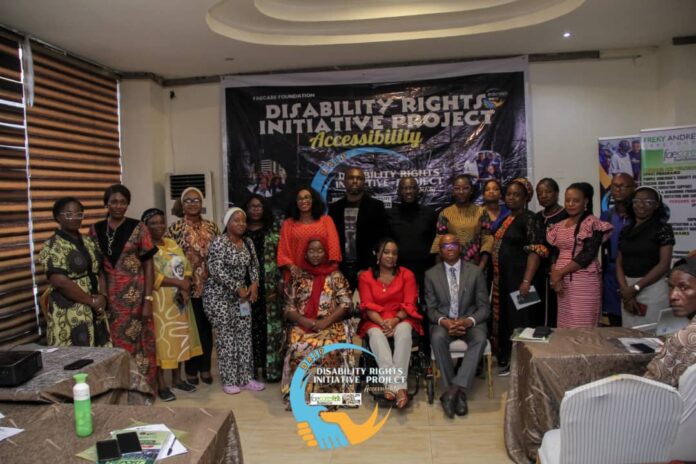Port Harcourt, Rivers State – July 23, 2024
In a passionate plea for inclusivity, the FAECARE Foundation held a press conference today to spotlight their ongoing efforts to enhance accessibility and uphold the rights of Persons with Disabilities (PWDs) in Rivers State. The event marked a pivotal moment, drawing together various stakeholders committed to making the state more inclusive.
Ambassador Ndifreke (Freky) Andrew-Essien, Executive Director of FAECARE Foundation, opened the conference with heartfelt gratitude. “Your presence today signifies a profound commitment to advancing the rights of Persons with Disabilities in Rivers State,” she said. “This gathering is a testament to the importance you place on ensuring that our community is no longer subject to disenfranchisement and rights violations.”
FAECARE Foundation, renowned for its dedication to vulnerable groups, introduced its latest initiative, the Disability Rights Initiative Project Accessibility (DRIPA). Supported by the Disability Rights Fund (DRF), DRIPA focuses on improving the physical environment’s accessibility and raising awareness about disability rights among PWDs and the general public.
Highlighting the foundation’s achievements, Andrew-Essien shared the successes of the Disability Rights Initiative Project (DRIP), which revealed a direct link between awareness of disability rights and positive attitudes towards PWDs. Participants who had interacted with FAECARE Foundation showed significantly better understanding and attitudes towards disability rights. However, the research also exposed the limited impact of the Rivers State Persons with Disabilities Welfare (Enhancement) Law of 2012, due to the absence of an effective disability council and comprehensive disability rights.
“Accessibility is a cross-cutting human rights concern for Persons with Disabilities,” Andrew-Essien emphasized. “It is essential that we address it in all its complexity, including the physical environment, transportation, information and communication, and services.” She outlined how DRIPA has already empowered 40 PWDs, equipping them with the skills to advocate for their own rights and those of their peers through comprehensive training programs.
The conference also underscored the broader legal frameworks supporting disability rights, including Nigeria’s ratification of the United Nations Convention on the Rights of Persons with Disabilities (UNCRPD) in 2007 and the enactment of the Nigerian Discrimination against Persons with Disabilities (Prohibition) Act in 2019. However, the enforcement of these laws remains inadequate, particularly in Rivers State.
FAECARE Foundation envisions a Rivers State where accessibility is a core aspect of societal infrastructure. Their recent accessibility audit in Port Harcourt revealed significant barriers that limit PWDs’ participation in various aspects of life, leading to social exclusion. The findings, presented in detail at the conference, underscored the urgency for action.
The foundation put forth several key recommendations to advance disability rights in Rivers State:
- Domesticate the Disability Discrimination Prohibition Act or enact a rights-based disability law.
- Establish a Disability Council/Commission with its own budget.
- Appoint a Special Adviser on Disability Affairs to the Rivers State government.
- Conduct a public enlightenment campaign against discrimination and promote accessibility.
- Ensure inclusive project design from inception.
- Prohibit approval of non-accessible public building plans.
- Set up an accessibility committee to budget for reasonable accommodation.
- Modify infrastructure to enhance physical mobility.
- Provide professional training, including sign language interpretation.
- Collaborate with civil society and organizations of PWDs to improve accessibility.
- Establish a monitoring and evaluation framework for accessibility initiatives.
- Develop local government strategies for compliance with accessibility standards.
- Ensure all government buildings are accessible.
Civil society was urged to demand accountability, include disability in their programs, and increase awareness campaigns. The broader society was called upon to make reasonable adjustments for PWDs, promote awareness, and ensure private establishments are accessible.
Andrew-Essien concluded with a powerful call to action, urging all stakeholders to prioritize disability rights, accessibility, and inclusion in Rivers State. “Let’s make Rivers State accessible for all… All means ALL,” she declared, emphasizing the need for collective efforts to create a more inclusive society.
FAECARE Foundation’s commitment to advancing disability rights and accessibility in Rivers State is a beacon of hope and a rallying cry for all to join in the fight for an inclusive future.


